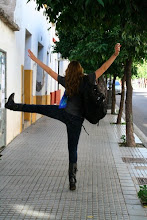Thinking about this semester-long class, one thing stands out in my mind: Until this class, I’ve never taken a course that centers on a literary genre where the genre itself wasn’t defined point-blank on the first day. At first, this seemed to be pretty frustrating and confusing, because I wasn’t really sure what I was looking for, what was important, etc. However, I think that in the end, it turned out to be a productive way to truly learn how to define a specific genre. Rather than memorizing a definition, it was something that I had to learn through my own reading experience with the help of guided lecture. In this way, I also feel confident that I’d be able to explain this genre* better because I had to fill in the blanks through my own experience.
As a point of criticism (which I think I may have mentioned in a previous blog entry), I think that this self-taught definition could be enhanced and refined through the addition of more texts that are truly considered to be magical realist texts. Now, I’m not suggesting that we should be reading more on top of what we already were assigned, but I think that maybe one of the texts which covers the build up to the magical realism could be replaced with short stories that fit in the genre. At the very least, it might be helpful to provide additional suggested texts that students can refer to if they still feel like they don’t fully understand what “magical realism” means/consists of [Side note: I lost the syllabus, so ignore the previous statement if these additional texts were included on that].
*Coming back to the idea of explaining the genre, something else that I never stopped to think about is that genres cannot be explained as something cut and dry. With magical realism, it is particularly easy to see, but even other movements that are considered to be pretty black-and-white cannot be so easily contained. Angel Flores points this out in one of the first articles written on magical realism in Latin American literature. He states that many literary critics attempt to classify novels and literary works in only one category, such as “romantic” or “naturalist,” not always taking into account that many works fall into multiple categories. In this way, Flores arrives at the idea that magical realism is, in itself a genre that depends on a balance of two “separate” genres.

I'd simply add also that "magical realism" is a pretty fluid category, into which people have tried to stuff a whole range of very different works. Yes, ideally we'd have read much more... but alas there's no time to do so. At least, however, I hope you got a taste.
ReplyDeleteI agree, I really enjoyed the fact that magical realism was not concretely defined because it creates space for us to analyze the category ourselves as we read the variety of texts that we have. For instance, even though McOndo is post-magical realism it deals with many similar issues as CAD, such as the ambiguous line between what's perceived as reality.
ReplyDeleteI really like your comments concerning the definition of Magical Realism. I also enjoyed the fact that the definition was not laid out for us and that we were able to formulate it through reading works which demonstrated the evolution of the genre. I thought that the choice of literature was great for this particular task, especially the last book. By including McOndo I feel I understood the idea of Magical Realism further as McOndo attempts to distance itself from the genre. As well, I felt that through the books we were also given a glimpse into the evolution of Latin America itself. I really enjoyed all the books and do wish we could have looked at other examples but given the work involved with a full course load, I am also glad that we didn’t.
ReplyDeleteHeya,
ReplyDeleteI think not defining what magic realism was at the start of the course was actually pretty good... This way, the class was more like an exploration about what it is, and it wasn't really self-taught.. cos I feel like self-teaching everything about magic realism and understanding cien anios with no help would have been pretty impossible..
Anyways, it was awesome to have read those different text also cos they are from different places. My issue wasn't so much to read more texts (though that would have been nice), I actually would've rathered studying cien anios in a lot more depth.. oh well..